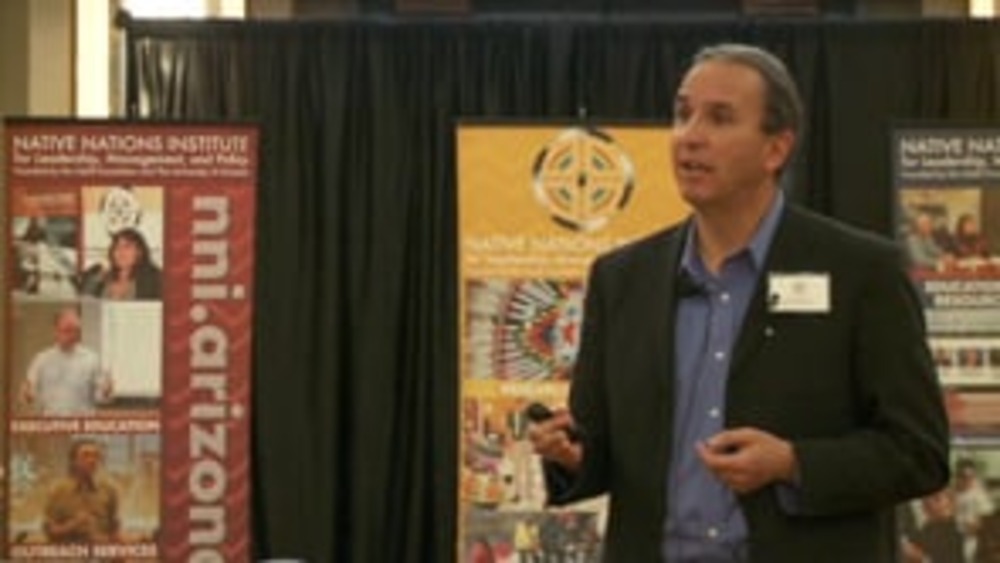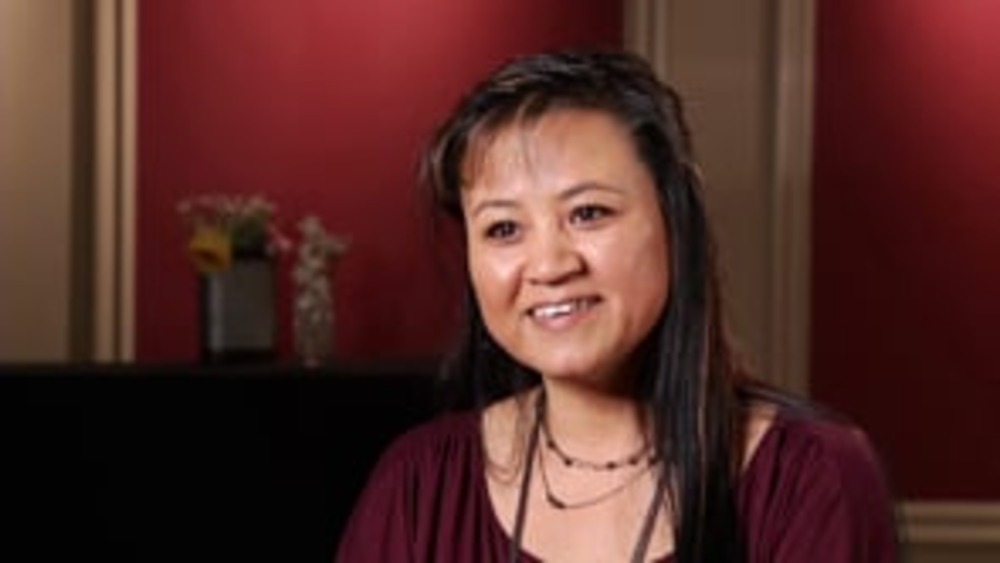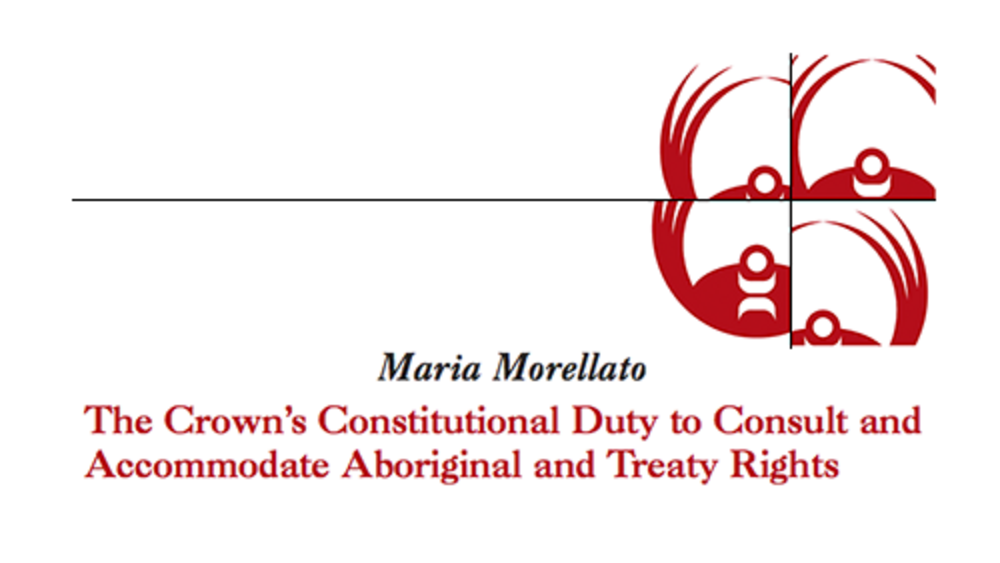Jennifer Porter, former chairwoman and current vice-chairwoman of the Kootenai Tribe of Idaho, discusses how her nation moved to amend it constitution to change its basis of political representation, how the U.S. Secretary of Interior and the Bureau of Indian Affairs (BIA) tried to block the move, and how and why her nation decided to remove the U.S government from the constitutional reform equation in order to make its governance system more culturally appropriate -- and effective.
Additional Information
Porter, Jennifer. "The Kootenai Tribe: Strengthening the People's Voice in Government Through Constitutional Change." Tribal Constitutions Seminar, Native Nations Institute for Leadership, Management, and Policy, University of Arizona. Tucson, Arizona. April 2, 2014. Presentation.
Transcript
Herminia Frias:
"Okay, so we're right before lunch and we have two great speakers lined up to talk about the issue and the challenges of citizen engagement. And I'm sure many of you have many stories to talk about when it comes to citizen engagement. How do you host a meeting and actually have people come and show up or have people actually come and participate? So we have two wonderful speakers this morning and the first speaker is going to be Jennifer Porter and she's the Vice Chairwoman for the Kootenai Tribe of Idaho, and she'll be speaking first. And then she'll be followed by Terry Janis, who is the Project Manager...who was the project manager for the White Earth Constitution Reform Initiative. So if we'd...first we'll welcome Ms. Porter."
Jennifer Porter:
"So my name is Jennifer Porter. I don't know what's worse, going before lunch or going after lunch because everybody seems to be thinking when are we going to eat this afternoon, and after lunch you're all tired and want to go to sleep. So I'll try to make this brief, but touch on the aspects of it.
There were a few questions yesterday that were asked and it was a gentleman over here and he kept wanting to know, ‘Well, how do we do it?' He wanted to know about like...I felt like he was asking a question, ‘How has it been done in the past? Like who actually did this? Who reformed their constitution? And I just...you kept hearing people say, ‘Well, tomorrow we'll have that story, tomorrow.' Well, tomorrow's here and I'm one of those stories.
I'm a former chairwoman. I've been on the council for the past 17 years. Recently this past October, I stepped down to the [vice-chairman's position] just to have more family time and to enjoy my life. After eight years, I think it was about time. I have recently become a grandmother so I thought, you know, it's time to let the youth...it's weird to say that, but I just...I've hit that point where I can say the youth now are coming up and taking these positions.
So our story, like I said, the Kootenai Tribe of Idaho, we're in northern Idaho. It's about a half-hour south of the Canadian border. It started in the mid 1990s. Prior to that our constitution, it stated in there a five-member council with our hereditary chief at the time having a sitting position on the council. So every time they had a new council come in and seated, it was always that same chief. He never had to vie for that position. He was always had that position and it seemed to be creating problems all the time. You have this one position and in our community it's made up of three main families. So you see three's the odd number. Whoever's getting along at the time, they'll vote these two families in. ‘We don't like this family, so we're going to keep them off.' And it did that for so many years and you see how every...
At the time, my mother was the chairwoman and she sat on for maybe about 10 years at that time and she said there were times where she would come home and she didn't know if she had a job or not. There was petitions; she would go off to a meeting, she'd come home and there'd be a petition to have her taken off the council. So she would kindly clear her office, fight the council, come back on and they would have her on again. And we hear about that in Indian Country all the time, and it kind of got to where they weren't moving forward. They were always just doing this little 'jumble effect' with council, who's going to be chairperson this week, who's going to be chairperson next month, that kind of thing, and we hear a lot about that in Indian Country still today.
Well, she was tired of it and she was tired of petitions and just like one of the gentlemen was stating yesterday, she kind of...she went back and she goes, ‘Well, how did we...how did we work as a so-called government before constitution, before this was put upon us? How did our elders do it? How did our community work?' She talked to the elders at that time and being with the three main families, it worked. They didn't need voting, they didn't need a constitution, they didn't need a paper telling them how to work their community and how to move forward. So what she did is she got those three main families together. And it was hard. And I could imagine all the fights back then, but all the people that were on council at that time, all the elders that were within those families at that time, all the people that would like...write those petitions and take them around and getting them signed. She got them all together at that time and she said, ‘We need to stop. We're losing our young people. We're losing our old people. In order for us to move forward and to grow as a tribe, we need to stop this.' She can't do her job, nobody can do their jobs. So they came to that agreement.
They all sat down and they came up with something. She said, ‘We need some kind of system that all three families will be represented, that nobody will ever feel left out again. We can all get along at the table.' So what they decided was they were going to rewrite their constitution and all three families were always going to have a seat at the table. They rewrote it to where they took off the chief as the standing position. Each district would be allowed to vote in -- from their families -- two positions on the council.
So mid...it was about 1995 they proposed four amendments to BIA [Bureau of Indian Affairs]. Amendment One had to do with blood quantum and changing enrollment wording with our tribe. Amendment Two was a proposal of changing the district factors into the three main families. The third amendment was the quorum issue, changing the seating from the three [for] a tribal quorum to the four. And the last issue was the naming of the tribe because we didn't want to be known as the Kootenai Tribe of Indians anymore, we wanted to known as the Kootenai Tribe of Idaho. So BIA was okay with the first amendment, they passed that no problems. They were okay with the fourth amendment. We have the right to change our name. But they weren't okay with us changing our structure.
They said we couldn't change it from the five people to the six people. So I asked yesterday, ‘Why weren't they okay with it?' And the answer I got was because of the size of our tribe -- which we are a very small tribe -- at that time, we were a little over...maybe between 110 to 120 and BIA said they were opposed to it because they more or less went towards the U.S. vote, 'one person, one vote,' and they felt going to the three districts or the three different families not every person would be represented as a vote. But we argued with that because we said the way it worked in our past was as long as they were within one of those districts, which made up our whole tribe, they would get a vote.
So it didn't take my tribe long, and I always say they were a bold council back then, and they weren't going to let BIA tell [us] what to do, so they took it upon themselves, they got all the tribal membership, they got them all onboard saying, ‘This is going to work. This is how it's going to work but we need you guys to jump onboard with us. We need you guys to support us. So what we're going to do is we are going to vote that BIA doesn't have a say on how we govern ourselves anymore.' So all they needed was a 70 percent voting of the membership. They got more than that. I think they got about 90 percent of our membership to say, ‘This is right. This is how we're going to do it.' They sent that to BIA, BIA approved that. It's just funny how they had no question to that. They approved it. They couldn't tell the tribe anymore how to run our constitution or how to do our government.
So once that was approved, the tribe took it upon themselves to change the constitution. They didn't need those powers over them and we changed it. So running today, we are the three family districts. Everybody votes for two members and I believe it's been 18, 19 years since that [amendment] and it works today, still today. I was just asked this morning, how is it run? I've never seen any better form of government. I can say maybe I haven't experienced what it was before, but I've only experienced this and I've never been through a petition. It's always worked. I have...out of all of our tribal members -- you ask any of them -- they feel like they do have a word in the community. They can go to a family, whoever their district representative, their family representative is and ask for something to go to the council.
And the way our council works is we do come together, but if a family or community member is asking for something or wants to know what's going on, the first thing we ask them is, ‘Have you talked to your district representatives?' Because with us, it's their responsibility to take care of their family first before they come to the table. We don't deal with the ones who, if they're from Family A, jump over to Family C and want us to push and fight. We've gone away from that. If they do make friends with Family B or C, we said, ‘No, you still have to go through your Family A. We won't even address that issue until we hear from your family and how they deal with that.'
I know I was asked to speak a little about how the tribe decided to not allow BIA to determine where the tribe was going and I found it interesting yesterday that there are so many tribes that are still under that notion that they've still got to ask BIA for everything. They've got to have BIA approval. And I guess maybe it's the whole way of thinking, but today with self-governance and under self-determination, it's the tribe's right to not do that anymore. And we just were one of those tribes who moved forward and got it done and it's working great today.
Joan [Timeche] finally got me down here to speak about my tribe. She's been after me for a number of years since I shared that story, because at the time she said she'd never heard of that concept, she's never heard of a tribe dividing like that and making it work."



